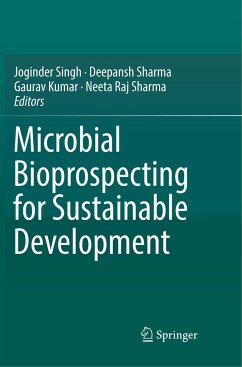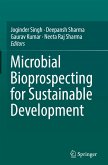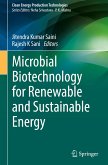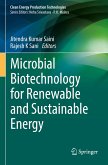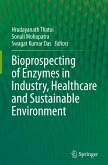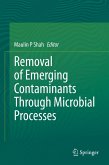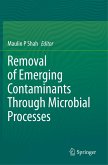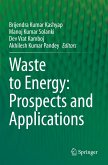Microbial Bioprospecting for Sustainable Development
Herausgegeben:Singh, Joginder; Sharma, Deepansh; Kumar, Gaurav; Sharma, Neeta Raj
Microbial Bioprospecting for Sustainable Development
Herausgegeben:Singh, Joginder; Sharma, Deepansh; Kumar, Gaurav; Sharma, Neeta Raj
- Broschiertes Buch
- Merkliste
- Auf die Merkliste
- Bewerten Bewerten
- Teilen
- Produkt teilen
- Produkterinnerung
- Produkterinnerung
This book presents a comprehensive overview of the use of microorganisms and microbial metabolites as a future sustainable basis of agricultural, environmental and industrial developments. It provides a holistic approach to the latest advances in the utilization of various microorganism bioprospecting including their wide range of applications, traditional uses, modern practices, and designing strategies to harness their potential. In addition, it highlights advanced microbial bioremediation approaches, including genetic manipulation, metagenomics analysis and bacteriophage-based sensors for…mehr
Andere Kunden interessierten sich auch für
![Microbial Bioprospecting for Sustainable Development Microbial Bioprospecting for Sustainable Development]() Microbial Bioprospecting for Sustainable Development119,99 €
Microbial Bioprospecting for Sustainable Development119,99 €![Microbial Biotechnology for Renewable and Sustainable Energy Microbial Biotechnology for Renewable and Sustainable Energy]() Microbial Biotechnology for Renewable and Sustainable Energy186,99 €
Microbial Biotechnology for Renewable and Sustainable Energy186,99 €![Microbial Biotechnology for Renewable and Sustainable Energy Microbial Biotechnology for Renewable and Sustainable Energy]() Microbial Biotechnology for Renewable and Sustainable Energy186,99 €
Microbial Biotechnology for Renewable and Sustainable Energy186,99 €![Bioprospecting of Enzymes in Industry, Healthcare and Sustainable Environment Bioprospecting of Enzymes in Industry, Healthcare and Sustainable Environment]() Bioprospecting of Enzymes in Industry, Healthcare and Sustainable Environment119,99 €
Bioprospecting of Enzymes in Industry, Healthcare and Sustainable Environment119,99 €![Removal of Emerging Contaminants Through Microbial Processes Removal of Emerging Contaminants Through Microbial Processes]() Removal of Emerging Contaminants Through Microbial Processes172,99 €
Removal of Emerging Contaminants Through Microbial Processes172,99 €![Removal of Emerging Contaminants Through Microbial Processes Removal of Emerging Contaminants Through Microbial Processes]() Removal of Emerging Contaminants Through Microbial Processes171,99 €
Removal of Emerging Contaminants Through Microbial Processes171,99 €![Waste to Energy: Prospects and Applications Waste to Energy: Prospects and Applications]() Waste to Energy: Prospects and Applications149,99 €
Waste to Energy: Prospects and Applications149,99 €-
-
-
This book presents a comprehensive overview of the use of microorganisms and microbial metabolites as a future sustainable basis of agricultural, environmental and industrial developments. It provides a holistic approach to the latest advances in the utilization of various microorganism bioprospecting including their wide range of applications, traditional uses, modern practices, and designing strategies to harness their potential. In addition, it highlights advanced microbial bioremediation approaches, including genetic manipulation, metagenomics analysis and bacteriophage-based sensors for the detection of food-borne pathogens. Lastly, it elaborates on the latest advances regarding the role of microbes in the sustainable development of various industrial products.
Produktdetails
- Produktdetails
- Verlag: Springer / Springer Nature Singapore / Springer, Berlin
- Artikelnr. des Verlages: 978-981-13-4319-3
- Softcover reprint of the original 1st edition 2018
- Seitenzahl: 408
- Erscheinungstermin: 26. Januar 2019
- Englisch
- Abmessung: 235mm x 155mm x 21mm
- Gewicht: 690g
- ISBN-13: 9789811343193
- ISBN-10: 9811343195
- Artikelnr.: 57627494
- Herstellerkennzeichnung
- Springer-Verlag GmbH
- Tiergartenstr. 17
- 69121 Heidelberg
- ProductSafety@springernature.com
- Verlag: Springer / Springer Nature Singapore / Springer, Berlin
- Artikelnr. des Verlages: 978-981-13-4319-3
- Softcover reprint of the original 1st edition 2018
- Seitenzahl: 408
- Erscheinungstermin: 26. Januar 2019
- Englisch
- Abmessung: 235mm x 155mm x 21mm
- Gewicht: 690g
- ISBN-13: 9789811343193
- ISBN-10: 9811343195
- Artikelnr.: 57627494
- Herstellerkennzeichnung
- Springer-Verlag GmbH
- Tiergartenstr. 17
- 69121 Heidelberg
- ProductSafety@springernature.com
Dr. Joginder Singh Panwar is presently working as an Associate Professor at the School of Bioengineering and Biosciences, Lovely Professional University, Punjab, India. Previously, he worked as a Young Scientist at the Microbial Biotechnology and Biofertilizer Laboratory, Department of Botany, Jai Narain Vyas University, Jodhpur for the Department of Science and Technology, Govt. of India. His research interests include the exploration of efficient strategies for the bioremediation and phytoremediation of pollutants from water and soil. Presently, his research activities are directed towards designing and developing cleanup technologies (biofilters) for the in-situ bioremediation of textile industrial effluents. He is an active member of various scientific societies and organizations including the Association of Microbiologists of India, Indian Society of Salinity Research Scientists, Indian Society for Radiation Biology, and European Federation ofBiotechnology. He has published more than 60 research and review articles in peer-reviewed journals, 2 edited books and 10 book chapters. Dr. Deepansh Sharma is an Assistant Professor of Microbiology at Amity Institute of Microbial Technology, Amity University, Rajasthan. He began his academic career as an Assistant Professor (Microbiology) at the School of Bioengineering and Biosciences, Lovely Professional University, Punjab, India. He has extensive teaching experience in the fields of Fermentation Technology, Food Microbiology, Industrial Microbiology and Microbial Technology. Previously, he was selected for a short- term scholarship (DAAD, Germany, 2012) to work as an international visiting researcher at Karlsruhe Institute of Technology, Germany. Furthermore, he is an active member of many scientific societies and organizations, including the Association of Microbiologists of India, American Society of Microbiology, European Federation of Biotechnology, and International Scientific Association for Prebiotics and Probiotics. To date, he has published more than 30 peer-reviewed research articles, 3 books on microbial biosurfactants and authored/co-authored chapters in 5 edited books. Currently he is involved in various consultancies projects involving food fermentation and product formulations. Dr. Gaurav Kumar is currently an Assistant Professor at the School of Bioengineering and Biosciences, Lovely Professional University, Punjab, India. He received his doctorate degree from VIT University, Tamil Naidu, India. His research interests include Pharmaceutical Biotechnology, Herbal Medicine, Marine Natural Products, Malarial Biology, Nanotechnology, and Biosurfactants. He serves as an editorial member and reviewer for many prestigious journals, including Frontiers in Biology, Pharmaceutical Biology, Brazilian Archives of Biology and Technology, Anti-Inflammatory & Anti-Allergy Agents in Medicinal Chemistry, and the International Journal of Pharmacy and Pharmaceutical Sciences. He is the author of more than 75 articles in peer-reviewed journals and has authored/co-authored numerous book chapters. Dr. Neeta Raj Sharmais currently a Professor & Associate Dean of the School of Bioengineering & Biosciences at Lovely Professional University, Phagwara, India. She received her Ph.D. in Biochemistry from Jiwaji University, Gwalior in 1995. She has more than 20 years of experience in research, industry, teaching and administration. Her scientific and technical research interests span various facets of biochemistry, toxicology, nutraceuticals, instrumentation, microbial biotechnology, computational biology, herbal chemistry, product development, microbial enzymes, fuel biochemistry and PCR for industrial and health sector applications. She has published more than 40 research articles, book chapters, and articles in respected journals. She is a member of various scientific societies, including the International Science Congress Association and Indian Society of Agricultural Biochemists.
Part I Microorganisms for sustainable agriculture and environmental applications.- Small at Size, Big at Impact: The Microbial Way of Life.- Bioherbicidal Concept: A Novel Strategy to Control Weeds.- Endophytic microorganisms as Bio-Inoculants for Sustainable Agriculture.- Endophytes: Golden treasure for enzyme inhibitors.- Microbial Bioremediation.- Bioremediation: An eco-sustainable approach for restoration of contaminated sites.- Myxobacteria: Unearthing the Potential through Research.- Part II Microorganisms for sustainable industrial important products.- Microbial Cellulases: Role in Ethanol production.- Application of bacterial polysaccharides in cosmetic industries.- Polyphenol oxidase, beyond enzyme browning.- Xylanases - For Sustainable Bioproduct Production.- Inulinase- An Important Microbial Enzyme in Food Industry.- Plant vaccines: an overview.- Microbial Biosurfactants: Future Active Food Ingredients.- Part III Microorganisms as future tools.- Microbial spores: Concepts and Industrial applications.- Insight into compatible solutes from Halophiles: Exploring Significant Applications in Biotechnology.- Riboswitches as molecular tools for regulating microbial gene expression.- Microbial Metagenomics for Industrial and Environmental Bio-prospecting: The Unknown Envoy.- Bacteriophage based biosensors for the detection of food borne pathogens.- Computational tools and databases of microbes and its bioprospecting for sustainable development.
Part I Microorganisms for sustainable agriculture and environmental applications.- Small at Size, Big at Impact: The Microbial Way of Life.- Bioherbicidal Concept: A Novel Strategy to Control Weeds.- Endophytic microorganisms as Bio-Inoculants for Sustainable Agriculture.- Endophytes: Golden treasure for enzyme inhibitors.- Microbial Bioremediation.- Bioremediation: An eco-sustainable approach for restoration of contaminated sites.- Myxobacteria: Unearthing the Potential through Research.- Part II Microorganisms for sustainable industrial important products.- Microbial Cellulases: Role in Ethanol production.- Application of bacterial polysaccharides in cosmetic industries.- Polyphenol oxidase, beyond enzyme browning.- Xylanases - For Sustainable Bioproduct Production.- Inulinase- An Important Microbial Enzyme in Food Industry.- Plant vaccines: an overview.- Microbial Biosurfactants: Future Active Food Ingredients.- Part III Microorganisms as future tools.- Microbial spores: Concepts and Industrial applications.- Insight into compatible solutes from Halophiles: Exploring Significant Applications in Biotechnology.- Riboswitches as molecular tools for regulating microbial gene expression.- Microbial Metagenomics for Industrial and Environmental Bio-prospecting: The Unknown Envoy.- Bacteriophage based biosensors for the detection of food borne pathogens.- Computational tools and databases of microbes and its bioprospecting for sustainable development.

